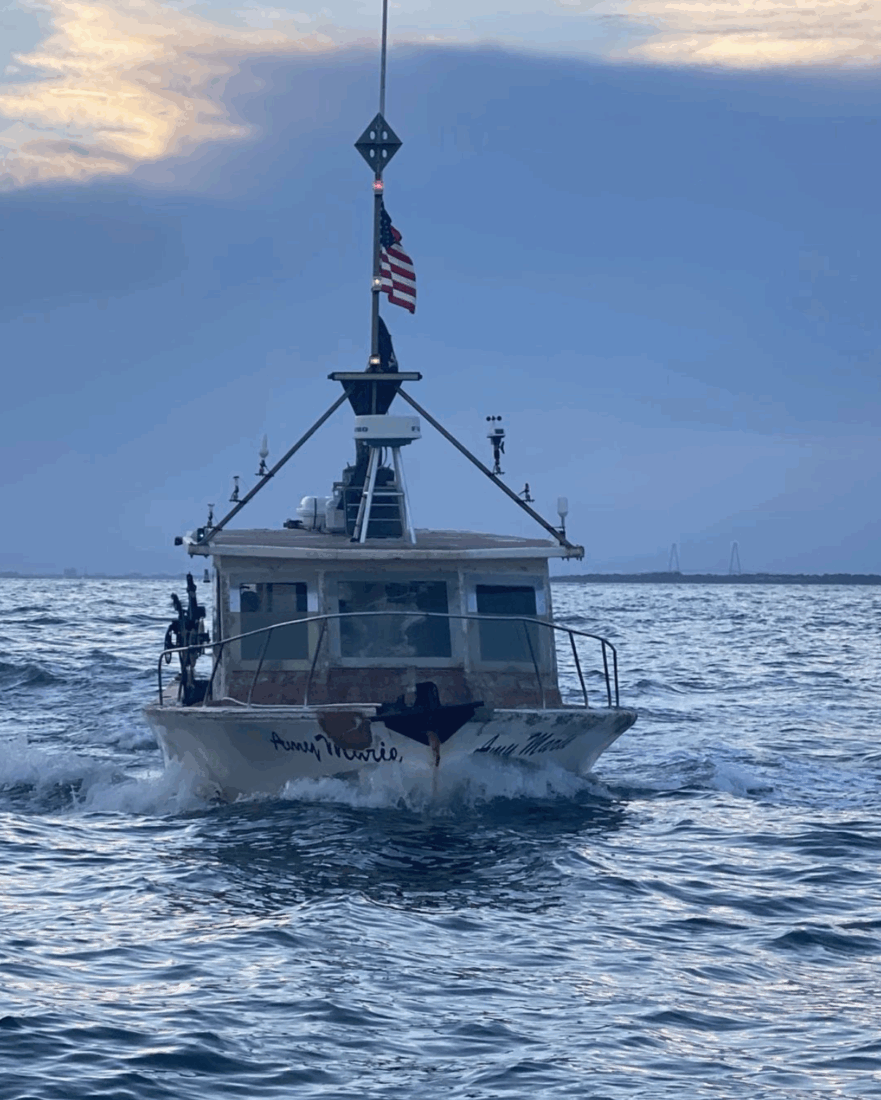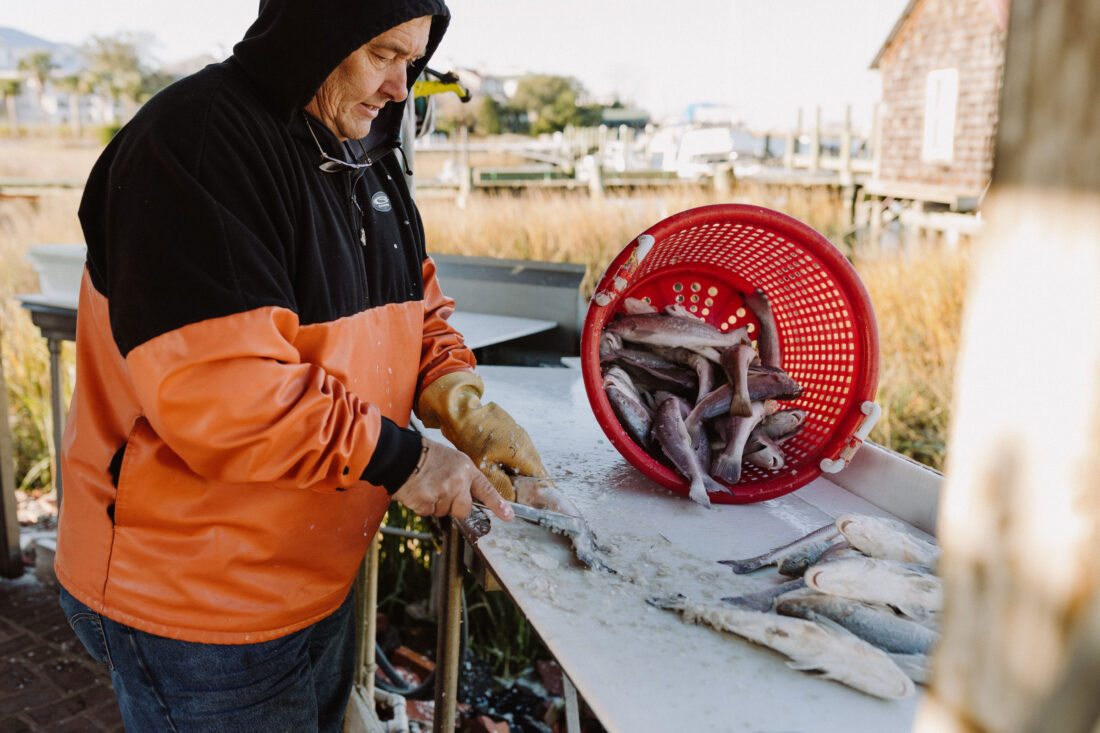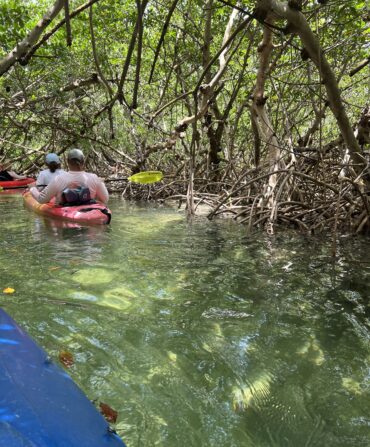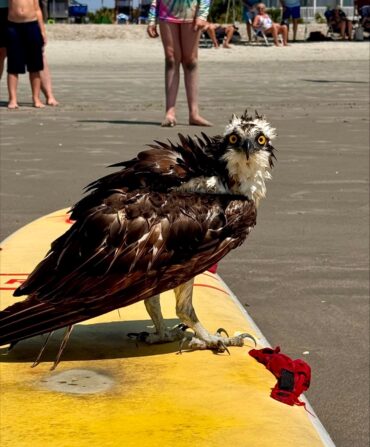Early Saturday morning, Mark Marhefka was floating in his fiberglass boat fifty-five miles east of the coast of Charleston, South Carolina, on a routine fishing trip. For nearly fifty years, Marhefka has furnished some of the best-loved restaurants in town—including the Ordinary, Fig, and the Grocery—with fresh-caught fish through his business, Abundant Seafood. In 2020 he won a James Beard Leadership Award for his sustainable fishing practices.
But on this trip, Mother Nature challenged his expertise. In the midst of a particularly sudden and strong lightning storm, Marhefka and his crewmate found themselves in the middle of falling bolts. Eventually one struck the VHS antennae of his trusty boat, the Amy Marie, completely zapping its electric systems, though thankfully no one was harmed. Still, Marhefka faced a grueling twenty-hour haul home with no navigation system. Back on land, he is still taking stock of the damage.
In the meantime, chefs and others who buy from him have started a GoFundMe page to help him fix his boat and get back on the water. “Mark inspires me everyday to give the best I have to this industry and those that I can directly affect with food and hospitality. His fish is always perfect, but his impact goes much deeper,” says Jason Stanhope, the executive chef at Lowland (who previously headed up Fig). “It is so important that I can shake someone’s hand and know that they are a good human who is working hard to invest in this community and do what’s right when no one is looking. We want to come together and give back to him after he’s spent so many years serving us.”
Below, we caught up with Marhefka about what the lightning strike was like, the reality of life as a fisherman, and the outpouring of support he’s receiving.
Tell us what happened.
We were out on the second day of a four-day trip, looking for snapper and grouper species. We had a couple nice gag grouper on the boat already and were hoping for some vermilion snapper, pink snapper, triggerfish, jacks, and such like that.
We were due east, about fifty-five miles out. We woke up and it was raining, and we were just going about our normal day. The rain let up from that storm, but the pop-up cells we are getting are so intense now. Around eight o’clock in the morning, this other storm was coming through. The front side of it was just rain, and the backside of it was where all the lightning was. When it started coming on to us, I thought to myself, God, this is awful. We tried to move away from it, but you can only run so fast when you have a huge cell coming over the top of you. Bolts of lightning were dropping all around us. I knew then that this was not going to go well.
Sure enough, we got zapped. I was at the wheel, which is metal, and luckily I had it wrapped in net twines. I got a little bit of a tingle, but I think that twine saved me. All the buttons came flying out of the VHF radio and popped me in the head. And everything on the screens went blank.
I had a South Carolina Sea Grant Consortium apprentice with me; this was her third trip out. She was directly underneath the antenna that got hit. It blew it apart and blew the cable off the bottom of it. You hear stories of boats getting hit by lightning and catching on fire. So I’m thinking, We weren’t hurt, we didn’t get a hole in the boat—this could have been so much worse.

How long did it take to get back?
The engine was not affected because it’s an old-school Detroit Diesel 671, and diesel engines operate on compression, not on spark. But it was hand steering, and it was a long way. We did maybe six knots, and I didn’t have an exact position of where we were. When we got to land, it was actually somewhere by McClellanville, so it wasn’t too far off. We got hit and we left at eight o’clock that morning. We got back to the dock tied up by three or four a.m. So about twenty hours.
What is the damage like?
I’m trying to get things ready to see if I can’t go and do a shakedown trip on the water. I’ve done about as many checks as I can do here at the dock. We just aren’t sure about the wires yet. I don’t have a real estimate in my head right now, but we’ve spent about $30,000 already, and we still don’t have all the equipment back on the boat.
The GoFundMe is definitely going to help get me back out as soon as I can. If there’s anything left over, it will be going into an emergency repair fund for the boat. For almost twenty years, we had insurance on the boat. And then, after I spent about $7,000 a year over those two decades, the insurance company said that they no longer insure this size of vessel. So they dropped me.
Tell us a little more about the boat and the business, Abundant Seafood.
The old Amy Marie was built in 1985, and I purchased it in 1988. We go out and catch the fish and come back to the restaurants that still want good stuff. And then we open up for retail and try and quickly as possible to get the fish sold. That’s when my fishing trip is finally over—when the last fish has been sold.
The people who support me enjoy fresh fish right off the boat. Where else can you go and have this scenario? I’m the one who catches the fish. I’m the one that cuts it and packages it up and hands it to the customer. It’s a full experience. I feel very fortunate and grateful to have the support in this community.
You’re going to keep going, I hope.
I’ve basically been in beast mode trying to get this boat back to running so we can go and generate some income. My crew has been losing wages since the [lightning] strike, and some of this funding will definitely go and help cover that for them. I just want to be back out getting fish to the restaurants and people who have been supporting me.
Somebody sent me a quote that said, “When you buy a fish, you are actually paying for the fisherman, not the fish.” Fishermen are the ones who are out there on the water putting their lives on the line. We’re not getting a lot of new people coming into the industry, and that’s the scary part. I am sixty-four years old, and this is something that I want to pass on. But the funny thing is after all this, I feel very renewed vigor, so to speak. Seeing the people behind me has gotten me excited about keeping at it.
Donate to the GoFundMe to help repair the Amy Marie and pay the wages of Marhefka’s crew here.








